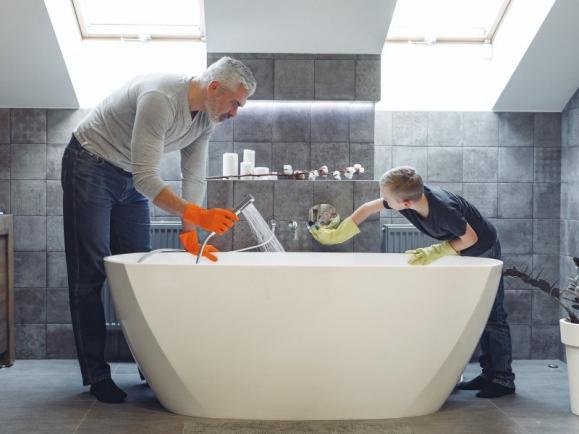
Children are often underestimated for their capability. Even toddlers can help with small and simple chores. By the time they are teenagers, they can tackle the same tasks their parents can. It is vital to get your children on a chore schedule when they are young so that they slowly learn the importance of helping the family.
Every child develops at a different pace. Some of these chores might not fit your child, so adjust accordingly. Chores should not upset or frustrate your child because they are too hard. They should be simple tasks that benefit the whole family. The assignments do not need to be done every day, so pick a rotation that works for your child’s schedule. Allowances or presents given for chores completed is up to the parent. Hopefully, this chart helps you organize a plan for your family.
Toddlers (2-3 Years Old)
While they may be young, toddlers can still learn about basic chores. Toddlers are at an age where they find helping friends, family, and caretakers to be exciting. They like to “copy-cat” adult behavior to learn. Additionally, teaching them early to help around the house will ensure they do not complain as much as teenagers. Toddlers will need to be supervised with their chores, but it can be a fun bonding activity.
- Put their toys away
- Place dirty clothes in the hamper
- Assist with making beds
- Put food or water in pet’s bowls
- Help a parent clean up spills
- Pick up trash and throw it away
Preschoolers (4-5 Years Old)
Preschoolers have similar “copy-cat” behavior as toddlers, and as such, will be willing to help parents or caretakers with chores around the home. They gain more responsibility at this age and can do more chores unsupervised. They have been able to master the skills necessary to complete these tasks, like better hand-eye coordination and the ability to follow complex instruction.
- Clear or set the table with an older sibling
- Dust with a cloth
- Match socks together in the laundry
- Sort laundry into lights and darks
- Help carry light bags of groceries
- Hang towels in the bathroom
- Clean their room weekly
- Clean floors with a dry mop
Primary Schoolers (6-9 Years Old)
Once a child has reached primary school, they have developed a lot of the skills needed to self-regulate. They can start doing more tasks that require physical effort and more complex tasks. Over time, they will develop new skills so that they do not require any supervision. Parents might start noticing their child rebelling against chores in this stage, but it is essential to still have them complete each duty. With patience, children will understand that they are expected to help around the home.
- Sweep the floors
- Help make lunches before school
- Put groceries away
- Load the dishwasher
- Vacuum small areas
- Make their own snacks
- Wipe down the table after dinner
- Empty out the trashcans
- Use a wet mop
- Fold and put away their laundry
- Take care of personal hygiene
Middle Schoolers (10-13 Years Old)
Middle school-age children can start doing tasks on their own and should not have to be given constant reminders. They should feel empowered to stay on top of their duties without extra assistance. At this age, a chore chart might be handy. Parents can hold the children responsible by checking once a week to make sure everything was completed. Children will learn to rely on themselves and be responsible when others are not looking.
- Start babysitting younger siblings
- Take trash cans to the curb
- Prepare simple meals without extra assistance
- Help wash the family car
- Start learning how to mow the lawn
- Pull weeds and water plants
- Be responsible for taking care of family pet
High Schoolers (14 Years or Older)
As high schoolers, these children can do almost any task that their parents can. Chores should focus on preparing the teen for life on their own one day. While they might not leave the house at 18, they should know by then how to handle a home. They should complete their housework without prompting. If your teen tries to rebel against the work, using positive reinforcement through allowances will help.
- Deep cleaning yearly for all rooms in the house
- Weekly cleaning schedule for all rooms in the house
- Babysit younger children independently
- Cook complex meals for the family
- Accomplish shopping trips after receiving their license
- Help parents with home or auto repairs
- Responsible for their own finances and purchases
- Wake up and get prepared for school on their own
The chores on this list are not a complete list of all the tasks your children can help with, but it is a great starting point. You might have to shift some depending on where your child is developmentally, but children are much more capable than you may initially think. When given the tasks, children and teens will step up to the plate to help their families. Chores help the family as a whole and are a great teaching tool.

